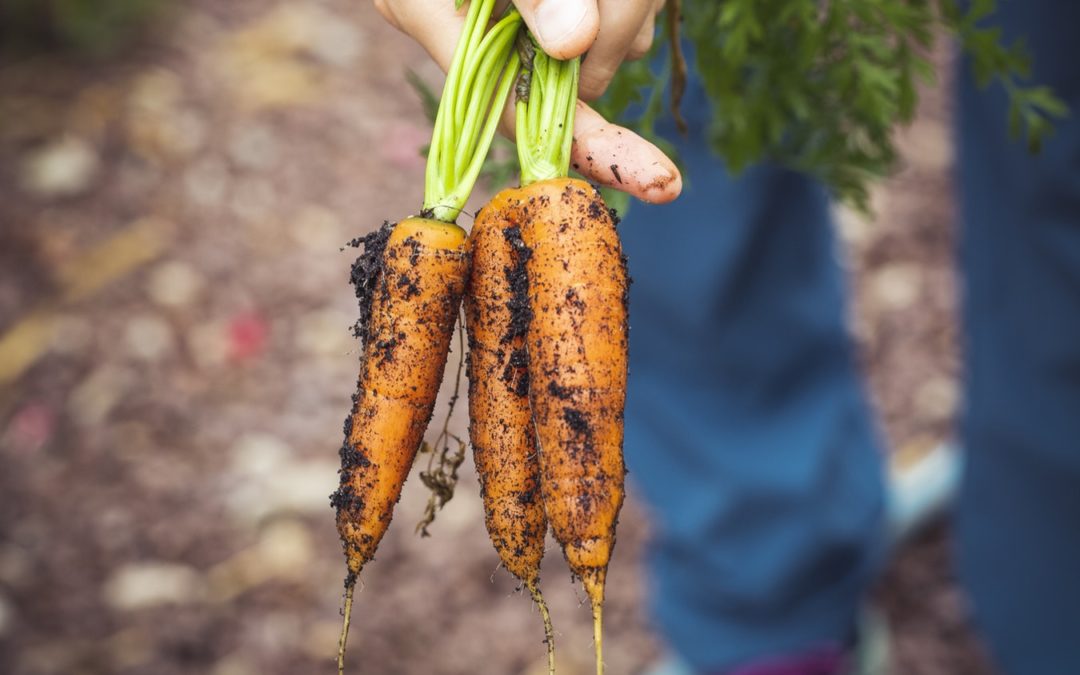You may have heard about the gut-brain connection. In this guest blog, Lydia Samuel explores how to have a happy belly: exploring gut healing foods with your own garden.
Humans are the only species that houses the physical self, the spiritual and the emotional self all in the wonderfully designed abode – The human body. If we go at a cellular level and break down into atomic level and try to go deeper what we are left with is energy vibrating at a specific frequency. Hence the master design of the human body is so interwoven that any specific change is any part of the body/mind/spirit combination affects the whole being. The concept of compartmentalizing the human body and zeroing in on specific organs and specializing on the same became common place in medical industry only less than a century ago. Human race always lived in tribes and had healers healing the body as a whole. That sort of got me into this awareness where for any disease, I started looking on the inside for answers to heal myself rather than a pill.
With this perspective, let’s look at what this Gut-Brain connection is all about. Hippocrates famously said “All disease begins in the gut”. I was fascinated when I first learned that the central nervous system and the gut are formed from the same embryonic cell. That’s the physical aspect of it. We also often say, “gut-feel” when taking a decision. What that literally means to me is i’m making my decision based off of input from my second brain, which is my gut. I would like to explain the gut health with an analogy. A few years ago when i started my own garden, the backyard I had was so full of hard rocks and impossible soil. I took it as a challenge to make my veggie bed in the desert landscape because i believed when given the right inputs, the soil can grow life again. This involved few months of prep work composting my veggie scraps and organic matter from the kitchen, prepping the soil with home-made compost, worm compost and minerals and testing the pH to make sure it can withstand the horrid 120 F heat and 32 F cold. It was like taking care of a baby. Now this process took about 4-5 months through the winter and when spring started, I sowed my seeds. I was surprised to see young saplings coming up in a couple days with the right sunlight, water and soil. A month later discovered a lot of earthworms trying to till and work hard to keep the soil healthy by breaking own organic matter and providing worm castings, a super fertilizer. I also had a lot of poles put
in to support creepers. Now when i took out one of the bamboo poles a couple months later it had a lot of fungus grow on it. That made me ecstatic since the once lifeless place was so full of life and thriving. The whole ecosystem came to life with soil microbes supported by fungus and earthworms and birds feeding on tomatoes and bugs and ground squirrels feeding on lettuce and tomatoes. I did not have to spray anything to keep insects out because the ecosystem took care of itself.
This is how our gut and microbiome are. The gut needs to be so full of symbiotic life for us to energetic, happy, mentally alert, fight off illness as though they never happened and go through phases of life with the right mindset. More and more studies are showing how our microbiome affects our fat storage, hormonal response, insulin response etc. Gut bacteria produce neurotransmitters that regulate your mood including serotonin, dopamine, and GABA. Whenever the gut is thriving and full of life, we remain happy and peaceful mentally alert and whenever we maintain that inner peace, the gut thrives. So it is a vicious cycle one feeding the other constantly.
Poor gut health leads to intestinal permeability a.k.a. Leaky gut, which is the state when the gut lining is damaged and it allows undigested food, toxins and pathogens into the bloodstream that cause systemic inflammation in the body. It continues onto create leaky brain which leads to fatigue, depression, anxiety, memory loss etc
Here are 3 tips to maintain a healthy gut.
1. Manage stress better – If we are in a state of constant stress the microbes do not colonize and i.e they don’t make babies rather they exit out of the body. Stress is a real No-No when it comes to healing the gut:
a. Physical stressors (physical injury, extensive exercises etc)
b. Emotional – This is a big one and many times the primary contributor impacting gut health. “You are the sum total of the books you read, the movies you watch, the people you hang out with and the conversations you engage in. So choose wisely what you feed your mind with”. One of the primary pillars for emotional health is Meditation – The positive effects of meditation is a podcast in itself but simply put the mind is so very powerful and complex. There are true stories of people who healed their terminal illnesses just by meditation. Also I have seen how positive affirmations while meditating, gratitude, hypnotherapy, guided visualizations, NLP, EFT are used to heal trauma and rewire the brain. Getting good quality sleep is imperative since the lymphatic system works and cleans out the neurotoxins when we sleep.
c. Environmental – We cannot bubble wrap ourselves when it comes to environmental pollutants however here are some pointers. Food – Remove foods that worsens leaky gut : alcohol, sugar, dairy, gluten, eggs, soy.
● Focus on gut-healing foods: bone broth, fermented foods (sauerkraut, Kefir, kimchi, picked veggies), prebiotic foods(dandelion greens, broccoli sprouts, asparagus,garlic,artichokes) spices (cumin, coriander, fennel, turmeric), vegetables, fruits, quinoa, pastured or grass-fed animal protein,and wild caught fish.
ii. Water – Filtered water, spring water
iii. Air – Indoor air is 2-5 times polluted compared to outdoor air as per EPA. Himalayan salt lamps, charcoal bags, Essential oils(be aware of some oils interacting with other household chemicals causing a toxic cocktail) can be used to purify the air of molds, VOC etc.
iv. Using all natural soaps, shampoos, cleaning products
2. Parasitic cleanse – This involves using herbs to clean the pathogenic bacteria/yeast(H.Pylori, candida albicans) periodically to maintain gut balance.
3. Testing the stomach acid levels and supplementing with HCl/ digestive enzymes/proteolytic enzymes or digestive bitters helps with better digestion and absorption.
Lydia Samuel is truly masterful at improving gut health through gardening her own vegetables.
Her story started with helping her own children and relieving them of their own health conditions through proper nutrition and gut health.
To contact Lydia email: healthalchemist2017@gmail.com


